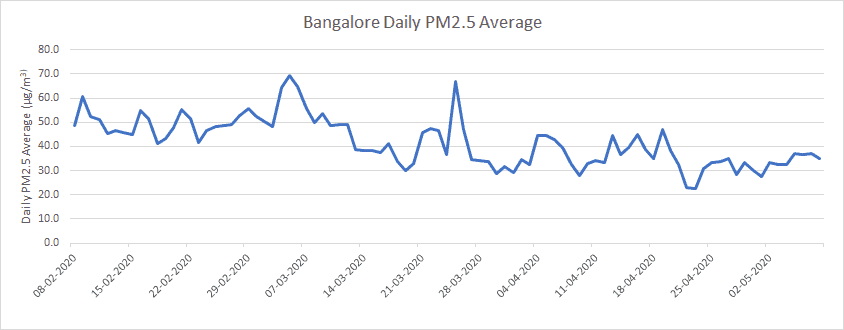An analysis of air quality data has shown that air pollution (measured as PM2.5) was reduced by an average of 28% in Bengaluru during COVID-19 lockdown. The analysis was done by the Centre for Research on Energy and Clean Air (CREA), using data collected by Bengaluru’s Healthy Air Coalition. Additional analysis of satellite data confirms this downward trend.
The Healthy Air Coalition had set up a network of 30 air quality monitors across the city (in places frequented by groups most at risk from air pollution) to provide publicly-accessible data on air pollution.
The Coalition has spent 12 months collecting data from 26 stationary air quality monitors across Bengaluru. Data for a 45-day period before the lockdown (February 8 to March 23) was compared with data from a 45-day period during lockdown (March 25 to May 8) to better understand the impact of reduced economic activity and transport on air quality.
The reduction in pollution levels varied for locations across the city, ranging from 14% at Halasuru hospital to 75% at Bellandur lake.

Aishwarya Sudhir, Coordinator of the Healthy Air Coalition said, “It appears that pollution from PM2.5 has been cut by more than a quarter on average. In some places air quality has actually met WHO safe levels, possibly for the first time in two decades”.
Before COVID-19, pollution – from traffic, solid waste burning, residential cooking and heating, and dust from road works and construction – led to constant poor air quality, failing to meet even Indian air quality standards, and substantially out of line with WHO air quality recommendations.

Emissions from vehicular pollution are a key contributor to air pollution in Bengaluru, which is the most traffic-congested city in India. Cases of child asthma, upper respiratory infections, chronic pulmonary disease, as well as heart attacks in young people are reported to be on the increase. Doctors and health professionals point to chronic exposure to air pollution as a possible cause.
Air pollution leads to seven million premature deaths each year globally. According to the Lancet, 12.5% of deaths in India are due to poor air quality, and half of those deaths are of people below age 70.
Dr K R Bharath Kumar Reddy – Pediatric Pulmonologist & Director, Shishuka Children’s Hospital, said: “A significant improvement in air quality in Bengaluru during the lockdown indicates the contribution of traffic to air pollution. Drop in levels, more so in areas known to be tech-corridors during a period of work-from-home, also points to this. This reiterates the need for us to take traffic regulation more seriously and implement strategies to control vehicular emission. We have also witnessed a significant drop in respiratory symptoms in children during the lockdown. The improvement in air quality could be an important contributing factor for this.”
Scientists have reported improvements in air quality during lockdown globally, in cities from Beijing to London, Milan to Delhi. While this occurred at enormous social and economic cost, it has illustrated the health and environmental benefits of reduced fossil fuel use in transport and energy.
The way forward
Healthy Air Coalition has written an open letter to the Mayor of Bengaluru on June 22, calling for a ‘Healthy Recovery’, which builds upon solutions such as the Yulu bikeshare system and the electrification of transport.
Transport sector plays a large role in air pollution in Bengaluru. It is also clear, from the “forced experiment” of reducing transport during lockdown, that the city can achieve breathable air quality through systematic, concrete steps, such as:
- Building people-friendly, safe Non-Motorised-Transportation systems for walking and cycling;
Also read: “Global cities are promoting cycling during COVID, Bengaluru should too” - Reducing the use of cars;
- Shifting to cleaner fuel and renewable-energy-powered electric vehicles;
- Enhancing public transportation system capacity and quality by running them on electric energy and increasing the numbers and frequencies, i.e., electric buses, suburban railway and metro etc.;
- Reducing contribution from the construction sector by taking proper safeguarding measures during construction and transportation of construction materials;
- Reducing waste generation and its disposal at landfill sites or in waste-to-energy plants by refusing unnecessary packaging material or plastics, and reusing and recycling whatever possible;
- Providing 24-hour electricity through aggressive adoption of roof-top solar energy and other renewable energy sources to reduce the use of DG sets for electricity needs; and
- Adopting stringent emission standards for brick kilns and industries to reduce pollution at source.
[This article is based on a press release from Healthy Air Coalition, and has been published with edits.]
When entire city is in lockdown, but pollution reduced by 28% is shocking, that means that when city is fully open as before, it does not matter! Or data collection and instruments are bogus !!